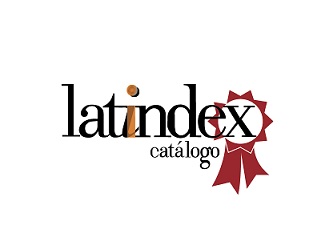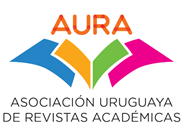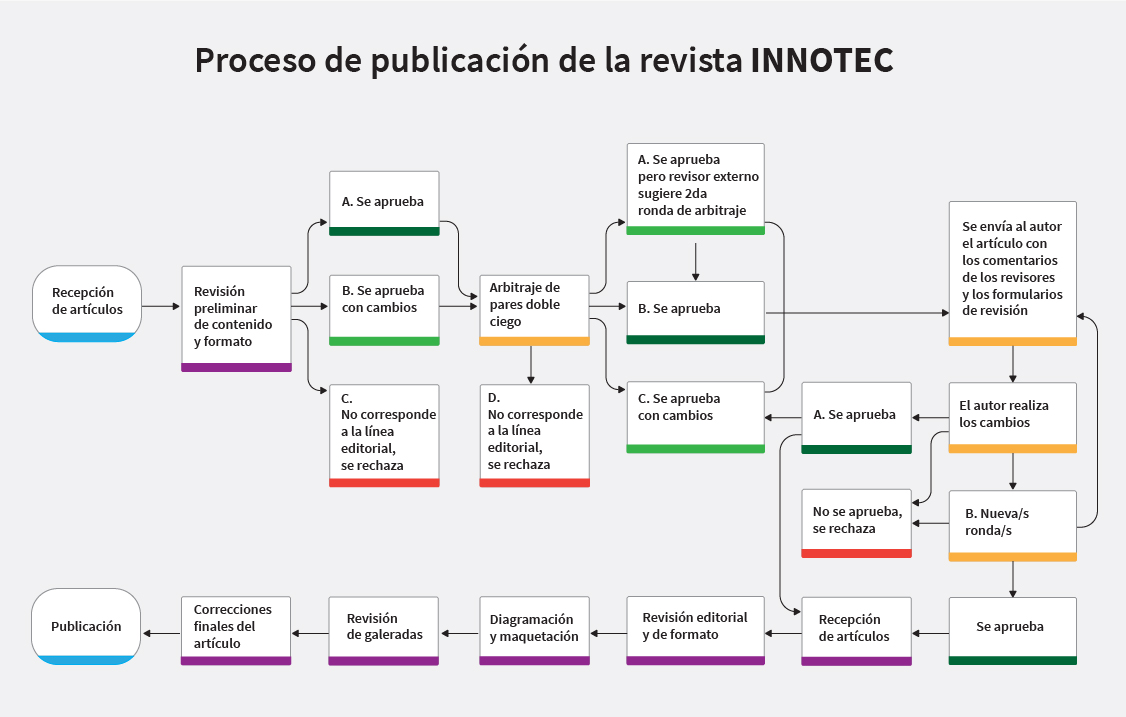Sobre la revista
INNOTEC es una publicación de acceso abierto arbitrada por un comité de revisores externos y editada por el Laboratorio Tecnológico del Uruguay (LATU). La revista contiene artículos originales inéditos y su periodicidad es semestral (enero-junio y julio-diciembre), bajo la modalidad de publicación continua.
El objetivo de la revista es la divulgación y transferencia del conocimiento en las áreas de Forestales, Medio Ambiente, Metrología y Tecnología Alimentaria. INNOTEC está dirigida a académicos, investigadores y técnicos de la comunidad científica uruguaya e internacional.
Página web: https://ojs.latu.org.uy/index.php/INNOTEC/index
(ISSN de la versión impresa ya cerrada 1688-3691 | ISSN en línea 1688-6593)
La abreviatura de su título es Innotec, que debe ser usado en bibliografías, notas al pie de página, leyendas y referencias bibliográficas.
Esta página utiliza sistemas de metadatos estandarizados OAI-PMH, Dublin Core y MARC cosechables por otros portales.
Se encuentra indizada en:
Directorio de revistas de acceso abierto DOAJ![]()
Base de datos Fuente Académica Premier de EBSCOhost

Sistema Regional de Información en línea para Revistas Científicas de América Latina, El Caribe, España y Portugal Latindex

Sistema de Información Científica Redalyc Red de Revistas Científicas Redalyc

Plataforma de contenidos científicos y académicos en acceso abierto producidos en el ámbito iberoamericano REDIB

La revista INNOTEC es miembro de:
Asociación Urguaya de Revistas Académicas AURA

Los artículos publicados a partir de 2012 se encuentran bajo la licencia:
Reconocimiento-NoComercial
CC BY-NC

Esta obra está bajo una licencia de Creative Commons Reconocimiento-NoComercial 4.0 Internacional.
Los artículos publicados hasta 2011 inclusive se encuentran bajo la licencia:
Reconocimiento-NoComercial-SinObraDerivada
CC BY-NC-ND

Esta obra está bajo una licencia de Creative Commons Reconocimiento-NoComercial-SinObraDerivada 3.0 Unported.
Política editorial LATU
La actividad editorial del Laboratorio Tecnológico del Uruguay (LATU) tiene como finalidad la difusión en la comunidad académica y profesional uruguaya de las investigaciones que apoyen el desarrollo de tecnologías y modelos de gestión que aporten valor a los procesos de innovación.
Misión
Nuestra misión es la publicación de trabajos originales con un enfoque de rigor y calidad teórica y metodológica que contribuyan a la producción sistemática de nuevo conocimiento científico tecnológico y al fortalecimiento de la presencia uruguaya en redes regionales e internacionales. Es de interés del LATU consolidar el campo de la documentación científica a nivel local mediante la creación e innovación de productos editoriales.
Los objetivos específicos son:
- Promover la publicación de investigaciones de excelencia en las áreas de conocimiento estratégicas del LATU, alineadas a su misión como impulsor del desarrollo sustentable del país y su inserción internacional a través de la innovación.
- Posicionar a los autores, técnicos y colaboradores en las plataformas electrónicas internacionales, estimulando su participación en el marco de un proceso de edición arbitrado por especialistas.
- Contribuir al desarrollo y transferencia de tecnologías de innovación orientadas a la mejora de procesos industriales, empresariales y sociales.
- Aportar y divulgar conocimiento científico de calidad a los técnicos, académicos, investigadores y a la sociedad en su conjunto, tanto para la efectiva transmisión de las experiencias como para el crecimiento profesional.
- Facilitar el intercambio y la creación de nuevo conocimiento entre instituciones.
Código ético de INNOTEC
La revista INNOTEC adhiere a los principios publicados por COPE (Commitee on Publication Ethics) y promueve así la conducta ética de todos los participantes del proceso editorial: autores, revisores y equipo editorial.
Política de detección de plagio y autoplagio
Cuando el Comité Editor considera que un envío es de interés para la revista se utiliza Crossref para controlar la originalidad de los manuscritos recibidos.
Se entiende por plagio:
• Presentar el trabajo ajeno como propio.
• Adoptar palabras o ideas de otros autores sin el debido reconocimiento.
• No emplear las comillas u otro formato distintivo en una cita literal.
• Dar información incorrecta sobre la verdadera fuente de una cita.
• El parafraseo de una fuente sin mencionar la fuente.
• El parafraseo abusivo, incluso si se menciona la fuente.
Se entiende por autoplagio:
• Cambiar la apariencia a un trabajo y presentarlo como si fuera otro distinto.
• Omitir la indicación de que el trabajo está siendo reciclado.
Si se detecta plagio en alguna de las instancias se interrumpe el proceso de evaluación quedando rechazada la contribución. Se notifica al autor el motivo del rechazo.
Los autores se comprometen a:
-Enviar artículos originales, de su autoría y que no infrinjan derechos de propiedad intelectual y/o derecho de imagen y/o de datos personales de terceros, e inéditos, que no hayan sido presentados simultáneamente a otra publicación.
-Asegurar la veracidad de los datos presentados en su investigación.
-Asegurar la integridad de su investigación, evitando la publicación de resultados parciales.
-Consignar a los autores de acuerdo al nivel de responsabilidad intelectual que han tenido en la elaboración del artículo, en orden decreciente, sin que medien otros criterios jerárquicos.
-Designar un autor de correspondencia, que asume la responsabilidad de difundir entre todos los autores los avances y resultados del proceso editorial.
-Identificar debidamente las fuentes originales de los trabajos que cita en su artículo.
-Revisar los antecedentes de otras investigaciones del ámbito teórico inmediato de su trabajo para dar cuenta de la información más actualizada y relevante.
-Reconocer los apoyos académicos, financieros y logísticos que hicieron posible la investigación y/o la elaboración del artículo.
Los revisores se comprometen a:
-Declarar que no existe conflictos de interés para la evaluación de un artículo.
-Realizar su evaluación respondiendo a criterios objetivos y respetando su independencia académica.
-Asegurar la confidencialidad tanto del contenido del artículo como del resultado de su evaluación.
-Preservar el anonimato en todo el proceso, apelando al editor como intermediario de cualquier comunicación con los autores.
-Respetar los tiempos acordados con los editores de la revista para la realización de su trabajo.
El equipo editorial se compromete a:
-Asegurar la honestidad y transparencia de todo el proceso editorial, desde la presentación del artículo, evaluación por pares y publicación en las condiciones pautadas.
-Seleccionar los revisores idóneos para cada trabajo.
-Garantizar la independencia de criterio de los revisores en el ejercicio de su rol.
-Asegurar el anonimato de todas las partes involucradas en el proceso de arbitraje por pares.
-Mediar en posibles conflictos de interés con el apoyo del consejo editorial.
-Velar por el cumplimiento de los plazos acordados en cada fase del proceso.
-Difundir los números publicados en las redes académicas y bases bibliográficas de su entorno local y regional.
-Controlar el cumplimiento de los requisitos por parte de los autores y la actuación acorde de los árbitros.
-Identificar casos de incumplimiento de los compromisos éticos enumerados en este código y penalizar a sus responsables con sanciones que van de la suspensión del infractor en su rol en el proceso editorial a la difusión de una rectificación pública y la remoción del artículo.La revista para garantizar la preservación de su contenido en acceso abierto a lo largo del tiempo, realiza los siguientes procedimientos:
-Periódicamente se realizan respaldos del software (Open Journal System) y de su contenido en los servidores de LATU.
-La revista utiliza un DOI en cada artículo subido para la identificación y localización inequívoca del documento.
-Los artículos se depositan en formato pdf y html, ambos formatos de amplio uso.
Tasa de rechazo
La tasa de rechazo de la revista años 2023-2024 es de 9%, en base a lo indicado en las estadísticas de actividad editorial de OJS.
Proceso de publicación









